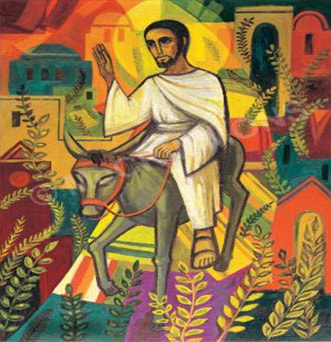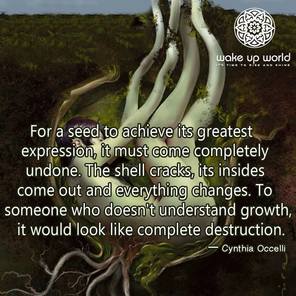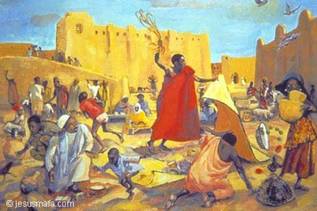
Psalm 118: 1-2, 19-29; Matt: 21:1-11; 2-17; 23-27;26:1-16
When my children were much younger, and still liked to go places with me, I would often take them to the St. Patrick’s Day Parade down Fifth Avenue in Manhattan. We’d watch the pipe and drum corps from high schools and volunteer fire departments file past. We’d note the Ancient Order of Hibernians from various New York counties decked out in glory. Maybe it was those tartan skirts, the plaintive cry of the bagpipe but I’d always find my eyes brimming with tears as the melody of “Danny Boy” drifted over the crowd. It brought back long buried memories of an Irish-Catholic childhood, of dead parents, and grandparents and the saga and struggles of the Irish as it filtered down through the O’hearnes, the Hennessey’s, the Samson’s and the Smith’s clans, to which my family belongs.
That is the power of a parade, a march or a procession. They pull us into a collective history. They give voice to a common pain or a common joy. From the Macy’s Thanksgiving Day Parade to the West Indies Labor Day Parade – to the March for our Lives event against gun violence held yesterday at over 820 sites across the world. People gather to march, to proclaim, to protest, to lift up a heritage or show pride in one’s identity -- they generate power to draw people together and rekindle hope and vision.
This Palm Sunday, we join with Christians all around the world in reenacting the excitement of Jesus’ triumphal entry into Jerusalem. In our songs, our readings and waving of palms and processions, we too invoke that age-old story of how Jesus entered the Holy City one last time. We remember that dream for deliverance the swelled the hearts of those people who lined the dusty road that Jesus took. Their hope is our hope.
We follow in the footsteps of the people of Israel, who knew how to put on a stellar procession. It is said some thirty thousand men accompanied King David to bring the Ark of the Covenant into Jerusalem. Vigorous dancing, songs, lyres, harps tambourines, castanets and cymbals; with a myriad of burnt offerings were all part of the pageantry. The people sang the popular psalm 118: “Open to me the gates of righteousness, that I might enter through them and give thanks to God.”
In this spirit, Jesus embraced the parade. He knew what it meant to the people. And the crowd sang songs, their equivalent to dear old “Danny Boy.” They sang out psalms of a common struggle, psalms that recorded the pain and promise of the Jewish people. “Hosanna to the Son of David” and “Blessed is he who comes in the name of the Lord!” they proclaimed, as they once did for King David, centuries earlier. They pegged Jesus as the new king David, a conqueror king. Yet Jesus deliberately entered in on a donkey instead of a war horse. Riding on a donkey would signal that Jesus chose peace over conquest. Still, as the events of the week played out, the crowd and the leadership clearly did not to understand Jesus’ mission of salvation and goodwill.
No doubt Psalm 118 dominated the procession. This psalm is a key processional psalm in the scriptures. It’s a parade song. People sung psalm 118 during major festivals and processions in the life of the Jewish community. The crowd sang such songs because they were filled with longings for a conquering messiah along the lines of a triumphant roman general, a mighty King David. They thought Jesus just might fill the ticket. Some “paved” the road with their garments which was a sign of submission before a dignitary (2 Kgs 9:13). Others threw down branches from the trees, most likely palm branches, where were symbols of victory and deliverance for the Jewish people (Suetonius, Caligula, 32).
Thus, began the collision course that would culminate on Good Friday. Our procession of texts read from Matthew today depict that not everyone was happy with the parade. Matthew tells us the whole city was stirred up, used also at Matthew 27 to describe how the earth shook at the moment Jesus died – it is a word related to seismic – describing how the earth shakes and moves violently during an earthquake. Jesus’ presence clearly shook people down to the core of their being.
It gets worse. As we heard, Jesus got into a confrontation with the money changers in the temple, and the leadership were indignant that children were continuing to sing the song of the parade, “Hosanna to the Son of David!” which connects the acts of Jesus to Israel’s most famous king. The next steps of Jesus’ parade took him to a heightened confrontation with the chief priests and elders of the people who question Jesus’ authority.
Jesus’ final step--before his procession to the Last Supper and the Cross --finds him in Bethany, a few miles outside Jerusalem at the home of Simon the Leper. The leadership actively plot his death. An unknown woman-prophet anoints Jesus on the head, an act that acknowledges someone as a prophet, or a king. The disciples fail to see the prophetic action. Instead they see focus on the extravagant cost of the perfume – which coming in at about $3,000 an ounce, was about a year’s worth of wages. As a result, Judas Iscariot sings his traitors song and betrays Jesus for 30 silver coins – about five weeks wages -- the cost of a slave. So, the cost of anointing was too much; the cost of betrayal was acceptable. Jesus’ parade of faith forced a confrontation with people, with temple moneychangers, with the leadership, and within his very core of disciples.
Through the unfolding of Holy Week, we see the real parade of faith emerge for Jesus. The one that leads to Golgatha, where he is crucified. Jesus remains on parade and true to himself and his mission. Jesus in fact picks up the quotes the parade psalm, psalm 118, to those plotting to arrest him: “Have you never read the scriptures,” he told the chief priests and elders, “the stone that the builders rejected has become the cornerstone?”
Likewise Psalm 118, the parade psalm was on Jesus’ lips the night before he died. As part of the ancient Passover ritual, Psalms 115-118 were sung at the conclusion of the meal. It is speculated that Psalm 118 just might have been the final song Jesus and the disciples sang as they left for the garden at the Mount of Olives. “I will not die but shall live and recount the deeds of the Lord…” was likely the last line Jesus sung before his arrest. I’d like to think that Psalm 118 was Jesus’ “Danny Boy” that song that Jesus kept close to his heart, that kept him going, as darkness descended Maundy Thursday night. Jesus will be betrayed, denied, abandoned, tortured, and publicly humiliated, but Jesus will not waiver. “The Lord is my strength and my might; he has become my salvation.” A parade song that sustained Jesus, even when he felt deserted by his Father.
This is why it is important that we begin Holy Week with the power of processions and parades. It reminds us of the living journey of our faith. This is the week our faith is on parade. Will we follow Jesus through that lonesome valley? Will we share that last supper with him? Will we stay awake with Jesus as he prays so earnestly in the garden? Will we remain steadfast as darkness descends or will we follow Jesus on that Via Delarosa to the cross at Golgotha?
Through the pain and sorrow that Holy Week evokes, I hear my grandmother singing:
Oh Danny boy oh Danny boy I love you so
But when ye come and all the roses falling
And I am dead as dead I well may be
Go out and find the place where I am lying
And kneel and say an ave there for me
As death’s dirge approaches, and the roses fall, the parade of faith summons us to kneel and pray. It calls us to remember the songs and scriptures once more. It calls us to remain faithful and steadfast in the parade of faith this Holy Week. It calls us to our common experience of suffering, and vision for a better life. A life that Jesus went to the cross for.
So today we begin the parade of our faith: the parade for our lives. May these comforting words from Psalm 118 touch us in our darkest moments this Holy Week: “Give thanks to the Lord for he is good, his love endures forever.” Let us add, hosanna, hosanna, to the Son of David. Amen.



 RSS Feed
RSS Feed